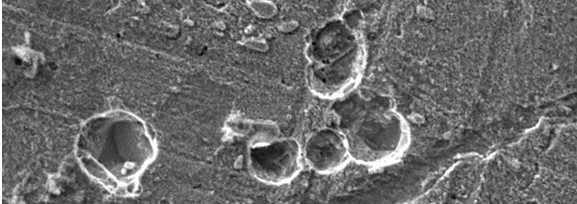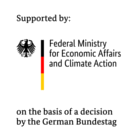IGF 21670 N

| Period: | 01.04.2021 - 30.11.2023 |
|---|---|
| Partner: | Technische Hochschule Mittelhessen, Gießen |
| Funder: | AiF |
| Project Manager: | M.Sc. Robert Sottor |
| Team: | Electrolytic Corrosion |
Description of the problem
Microbially influenced corrosion (MIC) or biocorrosion is a major factor contributing to the economic damage caused by corrosion. MIC occurs as a result of the presence or metabolic activity of microorganisms, primarily bacteria. Currently, to inhibit bacterial colonization of material surfaces, environmentally hazardous biocides targeting the metabolism of bacteria are often used in pipelines or tanks and production facilities. However, the extracellular polymer layer (biofilm) in which the bacteria are embedded has a protective function that can often only be countered by increasing the concentration of the costly and harmful biocides.
Therefore, the development of suitable methods for corrosion protection is of immense importance, both from an economic point of view and for the benefit of human health and the environment.
Approach
In order to effectively reduce biocorrosion on ferrous materials, this new IGF research project at the DECHEMA Research Institute in cooperation with the Technische Hochschule Mittelhessen (THM) aims to develop an environmentally friendly process that inhibits the attachment and biofilm formation of microorganisms relevant to corrosion by means of antimicrobial peptides (AMP). The AMPs, usually <30 amino acids short, often show a very fast and strong inhibitive effect on bacteria. At the same time, there is hardly any formation of resistance to AMPs by the bacteria. Synthesis of the peptides using standard methods allows the production of individually designed peptides that are optimally tailored to the application. Combined with the biodegradability of AMPs, they offer an ecologically and economically attractive alternative to conventional biocides.
Goal of the project
On the one hand, the project aims to identify new or optimized AMPs that offer a protection against microbially influenced corrosion. For this purpose, promising molecules will be identified from the wide range of peptides, synthesized and tested for their protective effect on ferrous materials. The efficacy of AMPs will be tested both directly on metal surfaces and in stabilized peptide solutions to suppress biofilm formation in closed water circuits.
In addition to extended material service life, the development of a new corrosion protection method is expected to offer technical and economic benefits, especially for small and medium-sized enterprises in the field of surface and cleaning technology.
back

Das IGF-Vorhaben Nr. IGF 21670 N der Forschungsvereinigung DECHEMA e.V. wird über die AiF im Rahmen des Programms zur Förderung der industriellen Gemeinschaftsforschung (IGF) vom Bundesministerium für Wirtschaft und Klimaschutz aufgrund eines Beschlusses des Deutschen Bundestages gefördert.